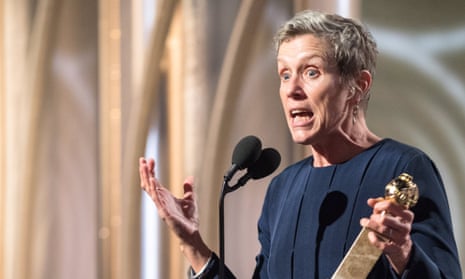The big question of this year’s Golden Globes was how the Hollywood Foreign Press Association would reflect the issue currently dominating Hollywood: the #MeToo movement. Things hadn’t got off to the greatest start – already before the gongs had been handed out , it had been criticised for failing to include a woman in the best director nomination list.
The event itself though immediately acknowledged the elephant in the living room, and put it centre stage in Seth Meyers’ opening monologue; he conceded the irony of having a man present the show, although pointed out, with some justification, that potential women presenters might be reluctant to associate themselves with the prize-giving establishment just at this moment. And the Globes ended with a rousing speech from Oprah Winfrey, winner of the Cecil B DeMille award for lifetime achievement: a performance which triggered euphoric #Oprah2020 hashtags. She certainly looked like she would turn and make mincemeat of Donald Trump if he tried his sneaking-up-behind routine while she was speaking. The evening was a sea of respectful black, although the assembled throng might well contain quite a few nervy men silently wondering if they really have got away with it, as my colleague Marina Hyde has pointed out.
Leading the way with four awards, Martin McDonagh’s Three Billboards Outside Ebbing, Missouri has become a symbolic billboard itself: the story of a very angry woman with nothing left to lose who demands to know why the bigoted male authorities are doing nothing about rape and murder – that is, the rape and murder of her daughter. Frances McDormand got the best actress (drama) Globe for the Mother-Courage ferocity of her performance and the film got best picture (drama) and best screenplay. Sam Rockwell got his best supporting actor prize for playing the morose, racist cop who goes on a journey of redemption – and incidentally beating out my personal tip, Christopher Plummer, famously brought in as an emergency replacement for Spacey to play the cantankerous oil baron J Paul Getty in Ridley Scott’s All The Money in the World. He also defeated Willem Dafoe who gave such an outstanding performance in Sean Baker’s The Florida Project.
Three Billboards is a fierce, stabbingly funny, laceratingly uncomfortable movie, and today it is probably the right film at the right moment, although there is a debate to be had about the intersectional issue; the extent to which the film matches its satire of racism with representation of black characters on screen.
Greta Gerwig’s autobiographical coming-of-age comedy Lady Bird is a lovely movie and a thoroughly worthy winner of best film (comedy/musical). Saoirse Ronan was also a very worthy winner for best actress (comedy/musical). This outstanding performer has found the ideal role for her complex, demanding screen presence. But this actually highlights the big injustice of the night: no nomination for Greta Gerwig in the best director category.
Gary Oldman was probably always going to win best actor (drama) for his irresistibly rousing, seductive and seamlessly latexed turn as Winston Churchill in Joe Wright’s Darkest Hour. Perhaps it should be pointed out that the respective ages of actor and subject aren’t so very far apart: Churchill was 65 in 1940 and Oldman is now 59 – but British men behaved like middle-aged frumps from about their late 20s in those days. The film is set in May 1940 as Hitler was poised across the Channel and the establishment, in the form of Lord Halifax (Stephen Dillane) and Neville Chamberlain (Ronald Pickup) were getting ready to revive the politics of appeasement. The film shows Churchill fighting a political war on two fronts and Oldman very entertainingly and shrewdly shows his balancing act.
I personally would have given the best actor (comedy/musical) prize to Daniel Kaluuya for his terrific performance in the race satire Get Out; in the event, it went to James Franco for his undoubtedly funny and technically very accomplished turn in the true-life story The Disaster Artist as Tommy Wiseau, the bizarrely untalented actor-director of the so-bad-it’s-a-masterpiece cult film The Room.
Allison Janney is a tremendously funny and droll screen performer and her best supporting actress (drama) Globe for her turn as LaVona Golden, mother of the disgraced skater Tonya Harding in I, Tonya will be a popular choice, although this must surely have been a very close call. Laurie Metcalf must surely have been in with a very good chance for her supremely good portrayal of Saoirse Ronan’s mother in Lady Bird and Mary J Blige and Octavia Spencer were both very good in Mudbound and The Shape of Water respectively.
The Shape of Water might, on the face of it, seem to be a bit of a loser in the proceedings: it won a best director prize for Guillermo Del Toro, but not the armful of prizes that many had predicted for the swooningly gorgeous sci-fi romance. This might well be how the Academy Awards play out for this movie, and it doesn’t quite do justice to this distinctive, immersively strange and rather wonderful fantasy film.
In terms of pure flat-out disagreement, I have only one: the best foreign film Golden Globe has gone to – groan! – In the Fade, by the usually excellent Fatih Akin. This is a mediocre revenge drama which looks like nothing more than the TV movie of the week. The film itself is a hand-wringing liberal-lite issue drama with a very moderate performance from Diane Kruger taking on – or possibly not taking on – the neo-Nazi terrorists who killed her husband and son. Every single other nominated film was much, much better than this ropey bit of silliness: particularly Andrei Zvyagintsev’s Loveless and Ruben Östlund’s Cannes Palme-winning The Square. But there you go.
The Globes did not disgrace themselves at this hour of trial, and in Frances McDormand and Oprah Winfrey, they had potent figureheads of protest.

